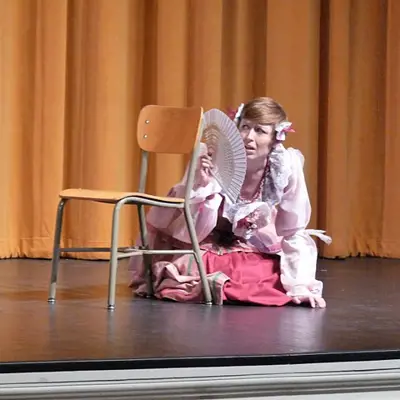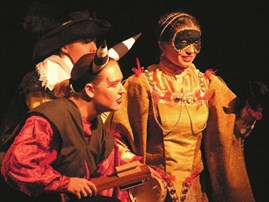
August 24, 2015
How does Dr. Anna-Lisa Halling get students to perform 17th century plays, and in Spanish nonetheless? Performance pedagogy is the answer. This approach practices the use of performance in the classroom as a teaching tool, to develop language proficiency and a deeper understanding of literature and text. Dr. Anna-Lisa Halling, assistant professor of Spanish, uses this strategy in her classes as a way for students to interact with course material on a more intimate level. Halling describes the plays as a holistic approach, "It boosts confidence in their ability to communicate in Spanish, builds vocabulary, builds reading comprehension and encourages a deeper appreciation of literature, culture and language."
Halling utilizes performance pedagogy differently depending on the course. In the Golden Age Drama class (SPAN 454), the approach is applied to help students understand the texts as performance pieces, and share what they've learned through community outreach by performing for audiences both on and off campus. However, in the Cultural Contexts for Conversation course (SPAN 205), it is used to help build the students' vocabulary, strengthen their pronunciation and promote memorization in order to build their confidence and skill in communicating in Spanish. Halling finds this approach to be more engaging, holding a more lasting effect on the students than having them complete a written exam.
 Performance pushes students outside of their comfort zones and encourages them to discover new talents. "The more student-centered we make the classroom, the better off the students will be, especially with language," she said. Students also are responsible for creating their own costumes. In the Golden Age Drama course, set in the 17th century, it means full dresses, hats, swords and men wearing tights. During a Christmas performance, students even dressed as elves. While performances haven't included any singing or dancing yet, Halling may incorporate these in the future.
Performance pushes students outside of their comfort zones and encourages them to discover new talents. "The more student-centered we make the classroom, the better off the students will be, especially with language," she said. Students also are responsible for creating their own costumes. In the Golden Age Drama course, set in the 17th century, it means full dresses, hats, swords and men wearing tights. During a Christmas performance, students even dressed as elves. While performances haven't included any singing or dancing yet, Halling may incorporate these in the future.
Outside the classroom, the performances introduce culture and language to internal and external audiences who don't necessarily speak Spanish. Students perform at USI and for USI's English as a Second Language classes as well as Central High School. The plays are so physical that the audience doesn't have to understand the language to appreciate the performance. "Outreach is fun because it lends itself to all kinds of audiences, and allows us to make connections within the community," said Halling.
The performance pedagogy approach was developed during her experiences at Brigham Young University, where she participated in a class offered through their Spanish and Portuguese department. The outcome of the course was the production of a full-length early modern play in Spanish, which she went on to direct. It was her participation in that course that set her on the path to become a professor and share her love of literature with others.
"I appreciate seeing my students develop an appreciation and love for early modern Spanish theater and the Spanish language, and share it with others," she said.